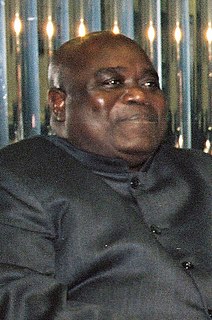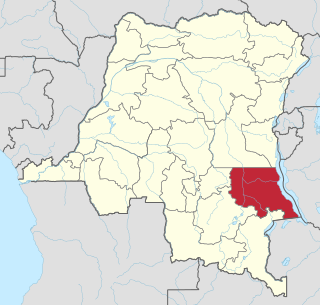Moba is a town located in the Democratic Republic of the Congo in Tanganyika Province. It is the administrative center of Moba Territory.
Moba is a town located in the Democratic Republic of the Congo in Tanganyika Province. It is the administrative center of Moba Territory.
Moba is situated on the western shore of the southern part of Lake Tanganyika, 140 kilometres (87 mi) south-east of Kalemie, to which it is linked by regular boat services. The Rafiki is the largest and most comfortable of the available ferry services. The larger town of Kirungu (Kilungu) is on a plateau 400 metres (1,300 ft) above the lake and 5 km from Moba. A dirt road leads down from Kirungu to a jetty in Moba.
Moba lies just south of the Mulobozi river. The Marungu highlands, a range of steep rugged hills, rises behind the town, bisected by the Mulobozi. The smaller northern section rises to an elevation of about 2,100 metres (6,900 ft) and the larger southern section to about 2,460 metres (8,070 ft). [1] The highest mountain in Moba is called Murumbi.
In 1984 Moba had a population of 25,463. Its ethnic identity is mostly Tabwa.
The city was created in 1893 by White Fathers who established a post at nearby Kirungu which they called Baudoinville/Boudewijnstad after Prince Baudouin of Belgium. [2]
During the Second Congo War (1998-2003) the region became a battle zone between government forces and rebel groups. The area between Pweto, Moba and Moliro has been called the "Triangle of Death". [3] In November 2000, DRC government troops with Interahamwe fighters, former Rwandan army troops now fighting for the DRC government and other allies launched an offensive. They captured positions held by the Congolese Rally for Democracy-Goma (RCD-Goma), such as Pweto, Pepa, and attacked Moba port. The RCD-Goma and Rwandan Patriotic Army (RPA) forces counter-attacked early in December 2000. The Rwandans re-took Pweto and Moba early in December 2000. [4]
On 1 August 2007 a mob of demonstrators assaulted United Nations military observers and damaged offices belonging to the UNHCR and sister agencies. The United Nations withdrew from the town and ceased repatriation of refugees living in Zambia. [5]
There are no paved roads in the Moba area nor within several hundred kilometres of the town. Two dirt roads, frequently impassable in the rainy season, are the only access by land from the west and south. Moba had long been without electricity. Since 1996, there is a small hydroelectric dam built to provide its population with electricity. This dam was sponsored by an Italian NGO, Mondo Gusto, on Ngandwe Fuamba river.
Economic activity in Moba is mostly farming, fishing and gold mining.

Ground transport in the Democratic Republic of the Congo (DRC) has always been difficult. The terrain and climate of the Congo Basin present serious barriers to road and rail construction, and the distances are enormous across this vast country. Furthermore, chronic economic mismanagement and internal conflict has led to serious under-investment over many years.

Laurent-Désiré Kabila or simply Laurent Kabila, was a Congolese revolutionary and politician who was the third President of the Democratic Republic of the Congo from 1997 until his assassination in 2001.

Lake Mweru is a freshwater lake on the longest arm of Africa's second-longest river, the Congo. Located on the border between Zambia and Democratic Republic of the Congo, it makes up 110 kilometres (68 mi) of the total length of the Congo, lying between its Luapula River (upstream) and Luvua River (downstream) segments.

North Kivu is a province bordering Lake Kivu in the eastern Democratic Republic of the Congo. Its capital is Goma.

Bukavu is a city in eastern Democratic Republic of the Congo (DRC), lying at the extreme south-western edge of Lake Kivu, west of Cyangugu in Rwanda, and separated from it by the outlet of the Ruzizi River. It is the capital of the South Kivu province and as of 2012 it had an estimated population of 806,940.

Goma is the capital of North Kivu province in the eastern Democratic Republic of the Congo. It is located on the northern shore of Lake Kivu, next to the Rwandan city of Gisenyi. The lake and the two cities are in the Albertine Rift, the western branch of the East African Rift system. Goma lies only 13–18 km (8.1–11.2 mi) south of the active Nyiragongo Volcano. The recent history of Goma has been dominated by the volcano and the Rwandan genocide of 1994, which in turn fuelled the First and Second Congo Wars. The aftermath of these events was still having effects on the city and its surroundings in 2010. The city was captured by rebels of the March 23 Movement during the M23 rebellion in late 2012, but it has since been retaken by government forces.
Banyamulenge, also referred to as nyamurenge and banyamurenge is the name that describes a Tutsi community in the southern part of Kivu, Democratic Republic of the Congo. The Banyamulenge of South Kivu are culturally and socially distinct from the Tutsi of North Kivu. Most Banyamulenge speak Kinyamulenge, which is a mixture of Kinyarwanda and Kirundi with specific phonological and morphological features not found in the latter two.

Tanganyika is one of the 21 new provinces of the Democratic Republic of the Congo created in the 2015 repartitioning. Tanganyika, Haut-Katanga, Haut-Lomami and Lualaba provinces are the result of the dismemberment of the former Katanga province. Tanganyika was formed from the Tanganyika district whose town of Kalemie was elevated to capital city of the new province.
Laurent Nkunda is a former General in the Armed Forces of the Democratic Republic of Congo (DRC) and is the former warlord operating in the province of Nord-Kivu, sympathetic to Congolese Tutsis and the Tutsi-dominated government of neighbouring Rwanda. Nkunda, who is himself a Congolese Tutsi, commanded the former DRC troops of the 81st and 83rd Brigades of the DRC Army. He speaks English, French, Swahili, Kinyarwanda, Lingala and Kinande. On January 22, 2009, he was put under house arrest in Gisenyi when he was called for a meeting to plan a joint operation between the Congolese and Rwandan militaries.
The Congolese Rally for Democracy, also known as the Rally for Congolese Democracy, is a political party and a former rebel group that operated in the eastern region of the Democratic Republic of the Congo (DRC). It was supported by the government of Rwanda, and was a major armed faction in the Second Congo War (1998-2003). It became a social liberal political party in 2003.
Kanyabayonga is a town in Lubero Territory, North Kivu province, Democratic Republic of the Congo. The town has suffered from continued violence between the army and rival militias since 1993.
The Rally for Congolese Democracy–Goma was a faction of the Rally for Congolese Democracy, a rebel movement based in Goma, Democratic Republic of the Congo (DRC) during the Second Congo War (1998–2003). After the war, some members of the group continued sporadic fighting in North Kivu. The movement also entered mainstream politics, participating in democratic elections with little success.
Rutshuru Territory is a territory in the North Kivu province of the eastern Democratic Republic of the Congo (DRC), with headquarters is the town of Rutshuru.

Pweto is a town in the Haut-Katanga Province of the Democratic Republic of the Congo (DRC). It is the administrative center of Pweto Territory. The town was the scene of a decisive battle in December 2000 during the Second Congo War which resulted in both sides making more active efforts to achieve peace. Pweto and the surrounding region were devastated during the war. As of 2011 little had been done to restore infrastructure or rebuild the economy. The town is served by Pweto Airport.

Pweto Territory is a territory in the Haut-Katanga Province of the Democratic Republic of the Congo (DRC). The headquarters are in the town of Pweto.
Pepa is a community in the southeast of Tanganyika province of the Democratic Republic of the Congo. It is located 167 kilometres northeast by road from Pweto, to the west of Lake Tanganyika.
Moba Territory is a territory in the Tanganyika Province of the Democratic Republic of the Congo. The administrative center is Moba port. The territory has an estimated area of 24,500 square kilometres (9,500 sq mi) and a population of almost 610,000.
The Marungu highlands are in the Katanga Province of the Democratic Republic of the Congo, to the west of the southern half of Lake Tanganyika.
The Mulobozi River is a stream in Tanganyika Province of the southeastern Democratic Republic of the Congo.
Kirungu is a town located in the Democratic Republic of the Congo in Tanganyika province. It is inland from Moba port, the administrative center of Moba Territory.